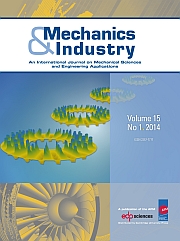Article contents
Wavelets-based damage localization on beams under the influence of moving loads
Published online by Cambridge University Press: 19 June 2013
Abstract
Early damage detection on structures plays a very important role for ensuring safety and reliability. This paper provides an efficient method based on wavelet transforms in order to detect and localize damage on structures subjected to moving loads such as beams and bridges. A numerical model based on the experimental test-rig utilized in this study is developed by using a finite element commercial software. Different types of damage on the bridge of the numerical model are simulated and transient analyses are performed by incorporating a load which moves constantly along the beam nodes. Continuous wavelet transform diagrams using the vertical acceleration responses show that damage can be identified and localized even with significant percentages of noise. Nevertheless, the method is improved by filtering the signals, removing the border effects, and calculating the total wavelet energy of the beam from the coefficients along the selected range of scales. Thus, the accumulation of wavelet energy could indicate the presence of damage. Finally, laboratory experiments are conducted to validate this work and a good agreement between numerical and experimental results is obtained.
Information
- Type
- Research Article
- Information
- Copyright
- © AFM, EDP Sciences 2013
References
- 4
- Cited by

